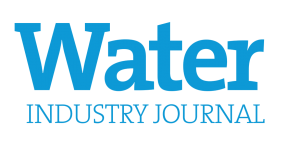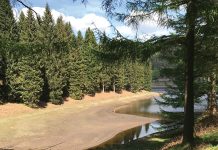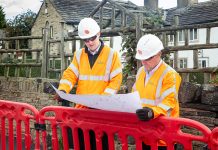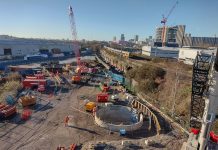WaterAid employs about 1,000 people in 38 countries to provide safe water and toilets to communities. Its work is carried out in partnership with hundreds of non-governmental organisations, government agencies, academic institutions and private companies, including those in the UK water sector. Here, we look at what a difference that is making.
Chandaka, in the Salima district of Malawi, has mustard leaves and rape seed growing along the river banks leading up to the village.
Water from the stream, once the community’s main water source, is now used solely for watering the village crops. A new borehole, built in 2015 by WaterAid and partner organisation ELDS, means the 34 households in the village now have a regular supply of safe water just steps away from their homes.
Before the borehole, the community relied on the river at the bottom of a steep slope for water to drink, cook and wash with and for watering their crops.
In the dry season, the river would almost completely dry up, and in the rainy season it would swell and become dirty and polluted. Sickness was common and every day women and children spent hours collecting water and carrying it up the steep slope.
Now life in the village is very different. Every house has a toilet, a bathing area and a cooking hut. The community makes money from selling agricultural produce and some of that money is used to keep the borehole and water pump working. There is a nursery school for under-fives and the community has seen a huge improvement in their overall health.
Zione Petulo, 22, now feels optimistic that her two year-old daughter Flora will grow up healthy and get a good education. When she was pregnant, Zione had to walk down the steep slope to the river to fetch water. She could only carry a small basin because of the weight of the water, which meant she had to make several trips to collect enough for her family to use.
She lost sleep at night because of the pregnancy pain which made collecting water even more difficult during the day.
She said: “When the borehole was put in, it was a very happy moment for us and we celebrated the whole night. We had to make sure the borehole was here to stay.”
Zione’s grandmother Kestina describes the clean water as medicine. Water from the river often had snails and other creatures in it. But since the community have been using water from the borehole, people are much healthier and the village has seen a dramatic fall in the number of cases of cholera and diarrhoea.
Helix Phiri is a teacher in the nursery school as well as the secretary of the village water and sanitation committee. He loves being a teacher and was delighted when the borehole brought clean water to the village as it meant it was finally feasible to have a fully functioning nursery. Helix was born and brought up in Chandaka and is hopeful about its future. He wants it to become an exemplary village and its children to achieve good education results.
WaterAid has been working in villages like Chandaka since 1981 when the charity was set up by a group of visionary leaders from the UK water industry. For 35 years the industry has shared WaterAid’s vision of safe water and toilets for everyone everywhere. The work in Chandaka is just one example of the progress being made towards this ambitious goal.
For the first time ever, nine out of ten people in the world have safe water to drink and use for cooking, washing, and growing food. And every year, 78 million people turn on a tap or use a pump for the first time. But there is still work to be done. With the ongoing commitment of partners and supporters, WaterAid believes everyone everywhere can have access to safe water and a decent toilet by 2030.
Find out more about WaterAid at
www.wateraid.org
Think you could drop all drinks except water in January? Join WaterAid’s Just Water challenge and help to get safe water to everyone everywhere: www.wateraid.org/justwater





